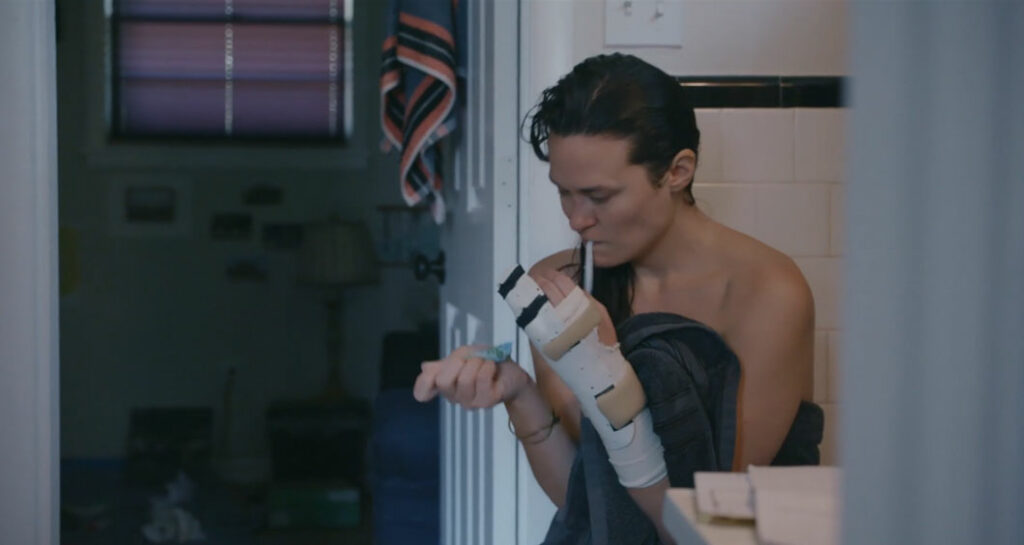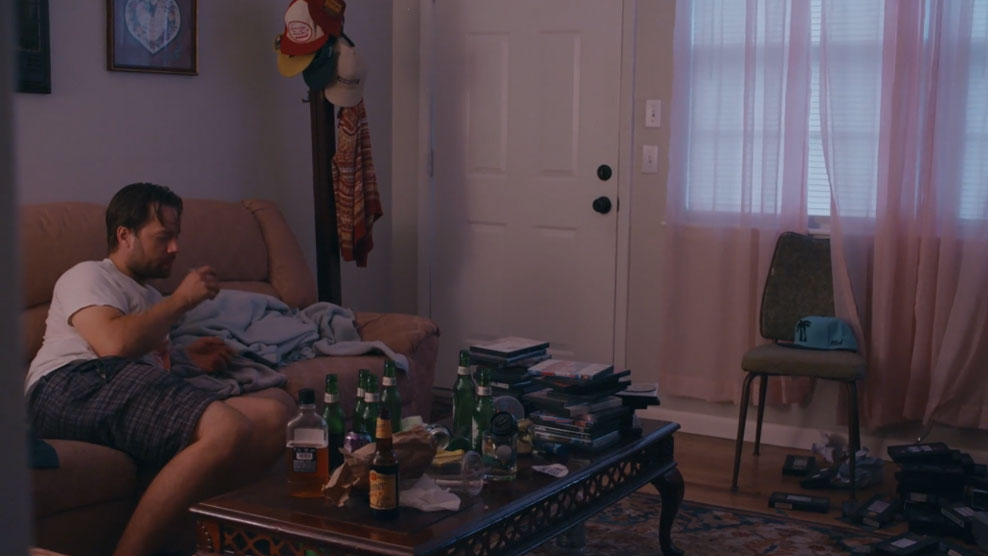I Can Feel You Walking is making its rounds at the Nashville Film Festival, and we met with director and star Rachel Lambert for an interview on the film.
I Can Feel You Walking was directed by Rachel Lambert, who also stars in the film. She plays Shannon, a woman with a broken arm who must be cared for by Kevin (Milton Katz). A majority of the film simply focuses on their lives and experiences over the course of a few days, leading to a confrontation between the two that brings out their insecurities about their lives, love, and being cared for. The film has a risky, almost non-existent structure and a documentary-like style that yield mixed results, but the personal, singular devotion and passion from Lambert are abundantly clear in every single shot and every word spoken. So, it was unsurprisingly illuminating to interview her about the film, her intentions, the process of filming, and what she hopes we can take away from the film.
The Dreamlike Experience of I Can Feel You Walking
The first thing that jumped out to me about I Can Feel You Walking is its dreamlike nature. It almost feels like a documentary at points. Was that the intention on your part?
Rachel Lambert: My partners in making the film, Sean [Clark] and Jace [Freeman, co-writers alongside Lambert], are their own sort of artistic team, the Moving Picture Boys. They’re documentarians whose work I love, and they seemed like natural allies because the filmmaking was going to be so much about capturing the moment and feeling very alive. I knew their instincts as documentarians would be so valuable to ensure the quality of the picture was great, and that they’d be able to capture the visual grammar, picture, and sound that we’d agreed upon as appropriate for the film. So that documentarian essence was very deliberate. With the way we made the film, we continued to develop and refine what the story of these characters would be in order to inform the aesthetic choices.
Once those were in place and our casting was done, we had about a month of rehearsal in the duplex. We knew our general blocking and where each piece was, but because we rehearsed it together, we could easily add new ingredients and be flexible. During that rehearsal period, we’d be testing the grammar that would come up to communicate and capture the action, dialogue, and world, sanding down the rough edges so we could really run with each day. They didn’t read a script. They didn’t know what we were shooting every day. Their first take was their first interaction with the material of the day, and they wouldn’t know what was going to happen, so their instincts as documentarians were fully at work, which also informed the subsequent takes. And I think that mixture made for a very alive set of instincts that would inform choices that we could run through or try for the next take.

Some of the story flow also felt dreamlike, including a set of repeated dialogue. Do you want to elaborate on the film’s narrative editing?
R. L.: I watched a lot of John Cassavetes films, so the cutting was certainly informed by that kind of new-wave grammar. That sort of cutting method is so much about the continuous pieces and emotional continuity, more than necessarily literal continuity. You’re traveling through space and time with a particular character, which I think contributes to that dreamlike state, certainly for someone like Shannon who’s high for most of the time that you first spend with her. But she’s also someone who’s at the bottom emotionally in her life. She’s drowning, so her connection to reality is tenuous. So, that kind of floating through time is how I think she digests time. You’re getting a sense of her state, her isolation and messiness. I think that even Kevin floats as well, but under different kinds of circumstances.
A lot of the movie is a series of long, extended sequences of characters just going through their days with no real progression. Was there a nervousness that a lot of audience members were going to lose their patience, or did you just commit yourself to this approach and do it the way you felt you needed to?
R. L.: Your latter instinct is right. From this film’s inception, I didn’t even know if this process was going to work, so there was very much a fealty to our voice and creative instincts. My job as the director was mostly to hone in on who these people are and what their story is in the post process. This kind of picture is about voice and telling a story in the way that feels the most true and honest.
The Actors’ Journeys in I Can Feel You Walking
You said the crew didn’t know what you were shooting ahead of time. Was that the same for the actors (aside from you) as well? How far in advance did they know what they were going to say?
Rachel Lambert: We built and cultivated real spaces that lived in this middle ground between real and unreal but were still very alive. For instance, for the scene where Shannon gets up to say her joke because she’s suddenly very bold, we had organized a night of comedy and music and invited a bunch of people who didn’t know what was going to happen. But then there were certain scenes that were scripted. For instance, I remember that before we started shooting one with Milton [Katz, who plays Kevin], there would be certain plot destinations or even staged destinations with how we would move through the space with a very specific choreography. But otherwise, it was quite improvised.
A lot of direction in the big dramatic scene towards the end was given with an emphasis for Kevin to really go after Shannon verbally. But Milton is such a caring person and we’re old friends, so he was expressing how he didn’t want to make me cry. He needed me to help him as his scene partner to really go after her and really nearly put her on the run. So that was something that was organized, but sometimes it took an hour long. One take is when Milton comes in from having a cigarette and we would go all the way to the end of Shannon’s speech.

The Heart and Takeaways of I Can Feel You Walking
There’s a monologue at the end where Shannon is talking about how she’s not used to being genuinely cared for. I’m sure you’ve felt like that in reality, but how much did that go into the inception of this movie at its root level?
Rachel Lambert: It’s very hard for me to accept love and care. It’s always overwhelming when I encounter it. I think the inception of the film was looking at the power of helping someone, of caring about a person, whether you’re “supposed to” or not given who you are or the nature of your relationship. This movie came to my head when I had cut my hand very badly and couldn’t use it (Shannon’s sling is the one I had from that experience). I was immobilized, and I would encounter these sometimes very deliberate moments of care, from a friend or a stranger, or from someone I might have met at a hand rehab facility. When someone is just nice to you, it is transformative, like a child’s story. I think those stories are in children’s books because they’re that foundational to the human being.
When I would encounter this care, it really took my breath away, so I wanted to explore that and show it to people, in a way that resembled my feelings and experience. It was almost necessary to have abstraction involved. And for anything that’s dealing in abstraction, when it comes to the breaking apart of time and experience to try and get to something more expressive as opposed to literal, you have to ask the audience to meet you halfway. You break down the cognitive dominance of the viewer a little bit when you try to submerge the narrative into something that’s expressive. So, the form did follow a function, and it was all rooted in how I need people to feel what these emotions are like.
What is the ultimate takeaway that you hope people have coming out of this movie?
R. L.: A lot of it is in that ending speech. I had been practicing and thinking about what to say for weeks, and I couldn’t come up with anything. I hated everything I was writing. But there was one phrase that I kept with me: “I give myself away for free all the time.” And another one that said, “You asked me if I’m going to be okay. And I don’t know. But I want to be.” I think both of those sentiments are about how much we value ourselves and each other. This is the most personal thing I’ve ever done. Dennis, my producer, looked me in the eye and said that if it doesn’t even get finished and it doesn’t work, that’s okay. So, I dismantled all the rules and really embraced a kind of freedom, and offered so much of myself into it.
This interview has been edited for length and clarity.
I Can Feel You Walking premiered at the Nashville Film Festival on October 1, 2022.

